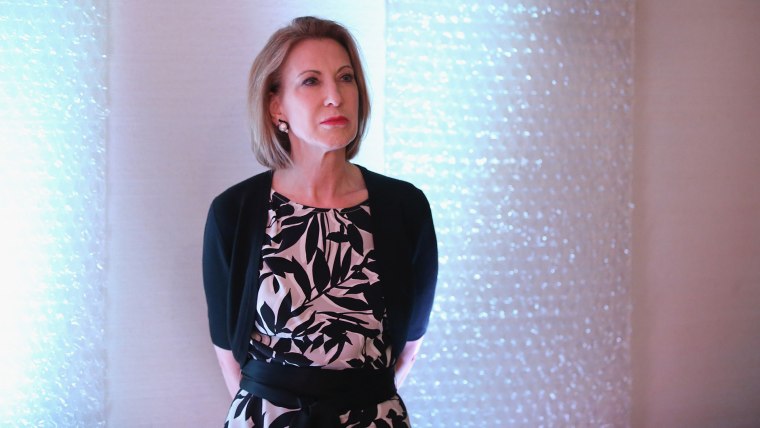Looking back throughout U.S. history, presidential experience has varied quite a bit. Some were governors, some were senators. Many wore the uniform. Some served in an executive-branch cabinet, a few served in the U.S. House. A handful checked more than one of these boxes.
But here's a good trivia question for you: who was the last president to get elected without ever serving in the military or holding public office? It's actually a trick question: it's literally never happened. Every American president has either held office, worn the uniform, or both before getting elected.
This year, however, a few Republicans believe they can buck the historical trend, and that group includes Carly Fiorina, a failed U.S. Senate candidate who had a
rough tenure in the private sector. The
Washington Post reports today on a Fiorina event in Iowa, where the GOP candidate fielded a question from a veteran who said he was having trouble getting a doctor's appointment through Veterans Affairs.
"Listen to that story," Fiorina said. "How long has [VA] been a problem? Decades. How long have politicians been talking about it? Decades." Fiorina said she would gather 10 or 12 veterans in a room, including the gentleman from the third row, and ask what they want. Fiorina would then vet this plan via telephone poll, asking Americans to "press one for yes on your smartphone, two for no." "You know how to solve these problems," she said, "so I'm going to ask you."
It's a curious approach, both to policymaking and presidential leadership. Fiorina apparently believes she can round up a dozen veterans -- who may or may not have an administrative background -- who can resolve years of challenges facing the VA.
Fiorina, at least for now, isn't offering her own solution to VA troubles, other than to rely on veterans with cell phones to vote in a telephone poll on whether they like what 10 or 12 other veterans came up with. (If enough vets press "two for no," are we to assume Fiorina will simply find another dozen servicemen and women and put them in a room until they come up with some other plan for her?)
There are a variety of ways to describe such an effort. A "serious approach to federal policymaking" isn't one of them.
Part of the trouble here may stem from the fact that, unlike every president in American history, Fiorina has no relevant experience. Note these related excerpts from the
Washington Post's
piece:
For GOP presidential hopeful Carly Fiorina, solving the nation's biggest challenges is pretty simple -- "it's not rocket science," as she likes to say. [...] "A lot of this isn't complicated," Fiorina said at a recent town hall here, adding: "Pretty basic." [...] Fiorina held firm that many of the country's biggest problems can be solved easily with "common sense" because they are "pretty basic."
The article added that the "press one for yes, two for no" style of leadership "was a bit of an oversimplification for many audience members."
Imagine that.
I can appreciate why someone with no background in federal policymaking or public-sector service may watch from the sidelines and assume governing is easy. Look at a problem, seek input, use good judgment, and voila! Piece of cake! It's all "pretty basic," according to the person who's never done any of this work,
If only this resembled reality in any way. National and international challenges in the 21st century are often incredibly complex -- technologically, politically, economically, morally, and diplomatically. It'd be delightful if a dozen well-intentioned people could write an idea for a cell-phone poll and solve chronic problems, but if it were that easy, they wouldn't be chronic problems.
To suggest otherwise is to accidentally confess to a lack of relevant preparation for national office.
